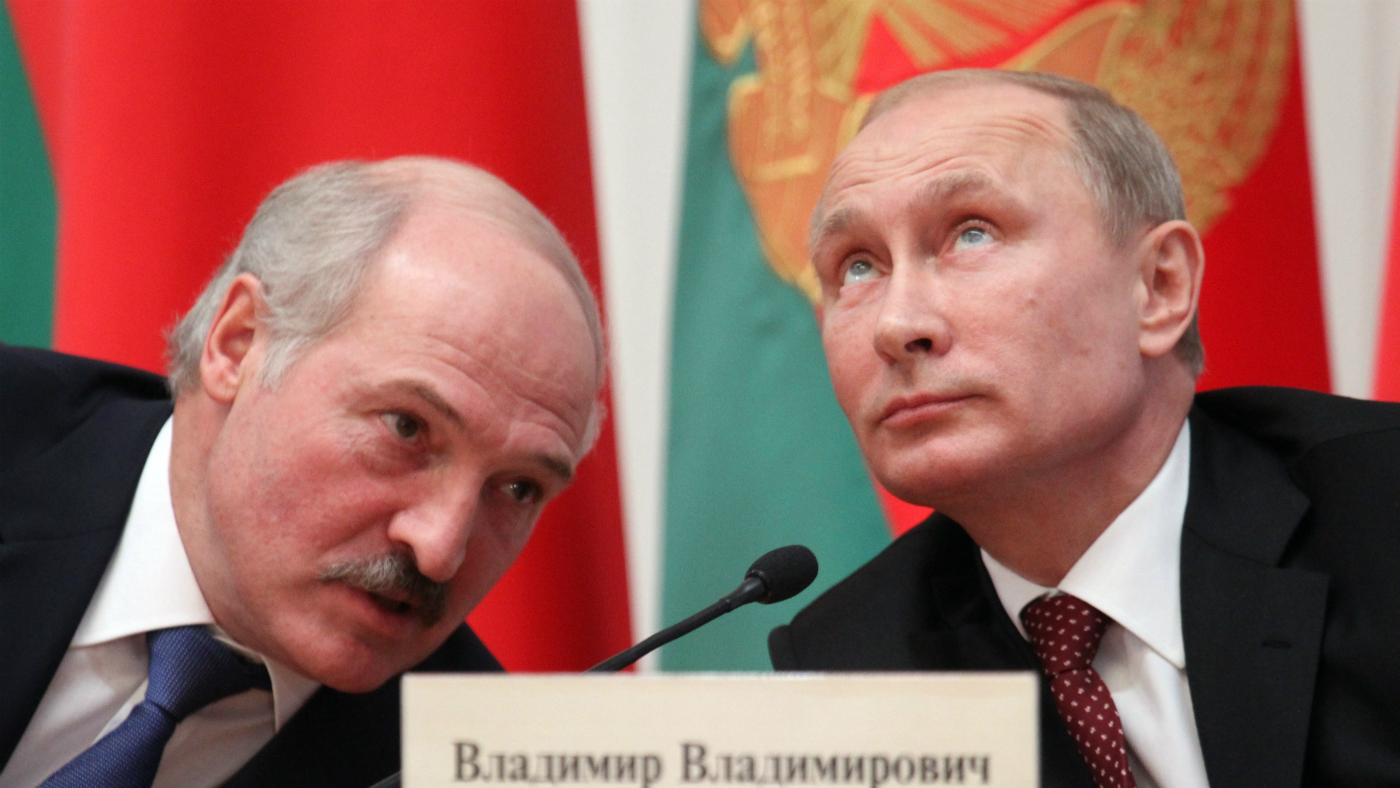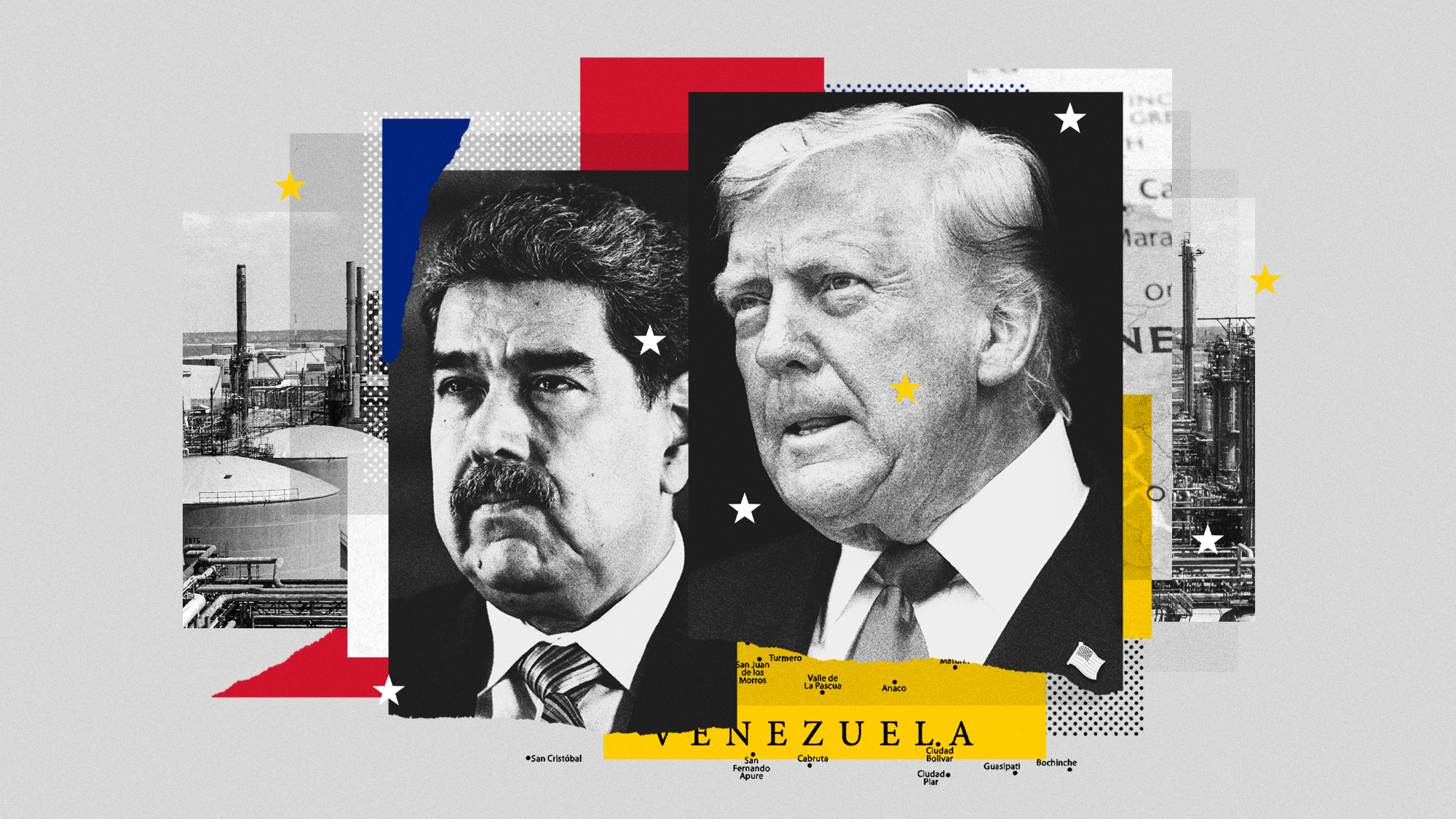Belarus protests: will Russia intervene to save ‘Europe’s last dictator’?
Minsk approaches Moscow for support amid violent protests over alleged election rigging

A free daily email with the biggest news stories of the day – and the best features from TheWeek.com
You are now subscribed
Your newsletter sign-up was successful
Belarusian President Alexander Lukashenko has reportedly appealed to his Russian counterpart Vladimir Putin for support as public unrest continues to grow over alleged election rigging in the former Soviet state.
Protesters have flooded the streets of Minsk and several other cities across Belarus in the wake of the vote on 8 August, which saw Lukashenko (pictured above with Putin) cling to power amid widespread claims of electoral fraud.
Lukashenko claims that Putin has offered him “comprehensive assistance” to ensure his country’s security, but pundits have predicted that the Belarusian leader’s days in office are numbered. Forbes report that the Putin regime “for many years hungrily has eyed Belarus” - so has Lukashenko just handed Moscow a pretext to annex the landlocked former Soviet republic?
The Week
Escape your echo chamber. Get the facts behind the news, plus analysis from multiple perspectives.

Sign up for The Week's Free Newsletters
From our morning news briefing to a weekly Good News Newsletter, get the best of The Week delivered directly to your inbox.
From our morning news briefing to a weekly Good News Newsletter, get the best of The Week delivered directly to your inbox.
What has happened?
The hotly contested election earlier this month saw an improbable 80.1% of the vote go to Lukashenko, who has held power since 1994 and is commonly referred to as Europe’s “last dictator”.
His main rival, Svetlana Tikhanovskaya, garnered just 10.12% despite optimistic forecasts for the former school teacher. By contrast, Lukashenko’s support appeared to be waning following his bumbled response to the coronavirus crisis and a stagnant economy.
The controversial vote result has triggered mass protests across the country, with a rally in capital Minsk yesterday attracting around 200,000 people, Reuters reports.
A free daily email with the biggest news stories of the day – and the best features from TheWeek.com
CNBC adds that some of the protesters waved the red and white flag used by Belarus prior to Lukashenko’s ascension to power, and chanted “Lukashenko step down” and “we won’t forget or forgive”.
The protests have been met with brutal force by the authorities, with at least two demonstrators reported to have been killed and thousands more detained.
How will Russia respond?
Russia and Belarus have maintained close formal ties since the Soviet Union collapsed in 1991, forming the two-party “Union State” supranational organisation in 1999.
Appealing to Russia to help quell the protests, Lukashenko has warned that the impact of the unrest might spill beyond Belarus’s borders, The Guardian says.
“There is a need to contact Putin so that I can talk to him now, because it is not a threat to just Belarus any more,” Lukashenko said on Saturday, according to state news agency Belta. “Defending Belarus today is no less than defending our entire space, the Union State... those who roam the streets, most of them do not understand this.”
Addressing supporters in Minsk on Sunday, the president claimed that “Nato troops are at our gates”.
“Lithuania, Latvia, Poland and our native Ukraine are ordering us to hold new elections,” he continued, adding that Belarus would “die as a state” if new polls were held.
His appeal for Russian aid comes just weeks after Lukashenko put significant strain on Moscow-Minsk relations by claiming that the Kremlin was sending mercenaries to Belarus to overthrow the government.
What would Russian intervention look like?
It is unclear exactly what Lukashenko wants from Putin, but some commentators have raised concerns that Belarus may have given Russia the “green light to intervene”, Forbes says.
In his statement on Saturday, Lukashenko claimed that Russia had “agreed that at the first request there will be comprehensive assistance provided to ensure the security of the Republic of Belarus”.
But according to the Institute for the Study of War, Belarusian state media “edited its reporting on Lukashenko’s statement at 9:45pm local time to insert the comment that Lukashenko would only invite Russian forces ‘in the event of external military threats’”.
Meanwhile, The Moscow Times argues that “Putin doesn’t want to intervene in the situation in Belarus”.
The Kremlin has been “careful about overtly backing Lukashenko in word or deed”, says the newspaper, which notes that Russian media has “reported openly on police abuses” in Belarus, while “prominent statesmen publicly called on Russia to abandon Lukashenko”.
“This is a far cry from the rhetoric and action that preceded Moscow’s military intervention in Ukraine” in 2014, when Russian officials and pundits called protesters “anti-Russian fascists” and their new government a “junta”.
Nevertheless, adds Reuters, Russia is likely to be “watching closely” as the ongoing protests continue, because “Belarus hosts pipelines that carry Russian energy exports to the West and is viewed by Moscow as a buffer zone against Nato”.
-
 What is the endgame in the DHS shutdown?
What is the endgame in the DHS shutdown?Today’s Big Question Democrats want to rein in ICE’s immigration crackdown
-
 ‘Poor time management isn’t just an inconvenience’
‘Poor time management isn’t just an inconvenience’Instant Opinion Opinion, comment and editorials of the day
-
 Bad Bunny’s Super Bowl: A win for unity
Bad Bunny’s Super Bowl: A win for unityFeature The global superstar's halftime show was a celebration for everyone to enjoy
-
 ‘The forces he united still shape the Democratic Party’
‘The forces he united still shape the Democratic Party’Instant Opinion Opinion, comment and editorials of the day
-
 How corrupt is the UK?
How corrupt is the UK?The Explainer Decline in standards ‘risks becoming a defining feature of our political culture’ as Britain falls to lowest ever score on global index
-
 Trump’s ‘Board of Peace’ comes into confounding focus
Trump’s ‘Board of Peace’ comes into confounding focusIn the Spotlight What began as a plan to redevelop the Gaza Strip is quickly emerging as a new lever of global power for a president intent on upending the standing world order
-
 The high street: Britain’s next political battleground?
The high street: Britain’s next political battleground?In the Spotlight Mass closure of shops and influx of organised crime are fuelling voter anger, and offer an opening for Reform UK
-
 Trump considers giving Ukraine a security guarantee
Trump considers giving Ukraine a security guaranteeTalking Points Zelenskyy says it is a requirement for peace. Will Putin go along?
-
 What have Trump’s Mar-a-Lago summits achieved?
What have Trump’s Mar-a-Lago summits achieved?Today’s big question Zelenskyy and Netanyahu meet the president in his Palm Beach ‘Winter White House’
-
 Why, really, is Trump going after Venezuela?
Why, really, is Trump going after Venezuela?Talking Points It might be oil, rare minerals or Putin
-
 Moscow cheers Trump’s new ‘America First’ strategy
Moscow cheers Trump’s new ‘America First’ strategyspeed read The president’s national security strategy seeks ‘strategic stability’ with Russia